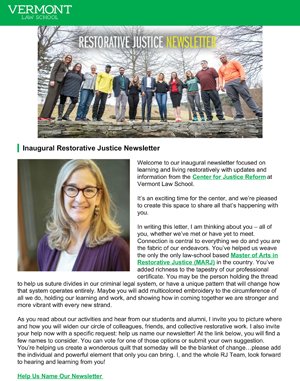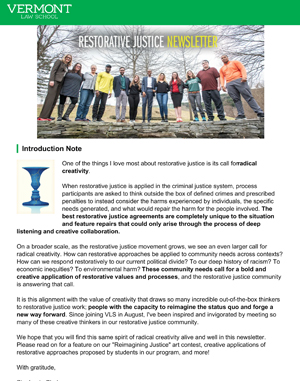Vermont Law Review at Vermont Law School will examine "Criminal Culpability—Who Deserves Punishment?" during a daylong symposium Friday, Sept. 16, in Chase Community Center at VLS. The event will feature scholars, attorneys, and criminal justice experts from across the country who will discuss the differences in how society treats white-collar criminals versus drug offenders, and explore solutions for both corporate crimes and Vermont's opiate epidemic.
"In a country that incarcerates its citizens at a higher rate than any other, a country that represents only five percent of the world's population but houses a quarter of its inmates, and that spends more on its prisons than on educating its children, it's important to take a step back and look at which citizens we are sending to jail and why," said Kelsey Bain '17, Vermont Law Review symposium editor. "This symposium will explore some of the disparities within the criminal justice system and examine the crimes we as a society believe deserve punishment."
"The difference between how we treat white-collar criminals versus drug offenders affects our country at large, but this year's symposium topic was selected with Vermont in mind," said Kandi Spindler '17, symposium editor. "In seeking solutions for both Vermont's opiate epidemic and corporate crimes, Vermont Law Review invites you to consider this: Who deserves punishment?"
Panels include:
9:45 a.m.: "Drug Reform—Does Criminal Law Disproportionately Punish Drug Offenders?"
Mark Osler, Professor, University of St. Thomas School of Law
Ekow N. Yankah, Professor, Cardozo School of Law
Jeremy Haile, The Sentencing Project, former Advocacy Counsel
Moderator: Robert Sand, Professor, Vermont Law School
Panelists will discuss whether drug offenses should be criminalized and the disparity of punishments given depending on the type or amount of drug, and the varying degrees of severity depending on whether there was intent to distribute versus mere possession. The panel also will cover what decriminalizing drugs would look like, using ideas such as the harm-reduction principle, and weighing the harms of criminalizing drug offenses versus the harms caused by legalizing certain drugs. If drug offenses remain criminal, panelists also will consider what changes should be made to prosecution and the subsequent punishment. What role would sentencing reform play? Should sentencing shift its focus toward treatment or is there a concrete need for jail-based deterrence?
11:15 a.m.: "White Collar Crime—Does Criminal Law Go Easy on White-Collar Crime?"
Jesse Eisinger, Columnist and Pulitzer Prize-Winning Reporter
Peter Henning, Professor, Wayne State University Law School
Ellen S. Podgor, Professor, Stetson University College of Law
Moderator: Jennifer Taub, Professor, Vermont Law School
This panel will explore the current landscape of federal and state white-collar offenses in modern criminal law. Panelists will debate whether there is actually excessive leniency on white-collar criminals, or if the current laws are justified given perceived difficulties in convicting these individuals and enterprises. What type of societal harm does white-collar crime cause and are these actually victimless crimes as some claim? Finally, are some white-collar criminals simply "too big" to convict? What mechanisms in our legal system might allow alleged white-collar criminals to buy their innocence?
1 p.m.: Keynote Speech
Jesse Eisinger, columnist and Pulitzer Prize-winning reporter, will discuss his forthcoming book concerning white-collar crime.
2:15 p.m.: "The Future of Criminal Policy—Where Should Criminal Law Focus Its Attention?"
William K. Black, Professor, University of Missouri, Kansas City, and University of Minnesota
Todd Cox, Director, Criminal Justice Program, Center for American Progress
Dan Sedon, Partner, Sedon & Ericson, P.C.
Rena Steinzor, Professor, University of Maryland, Francis King Carey School of Law
Moderator: Jennifer Taub, Professor, Vermont Law School
The final panel will explore the future of criminal law and policy. Is the criminal justice system rigged to favor the powerful, typically white-collar offenders, to the detriment of consumers, investors, and the general public? Are enforcement policies as well as proposed statutory reforms placing barriers around white-collar convictions and how do they compare with the mass incarceration of drug offenders? Does this proportionality speak to American values about who deserves punishment? Going forward, should individual interest or societal interest be the focus of criminal law, or should the level of harm be the only factor in determining punishment? Is criminal justice something that can be bought? Are there means by which a guilty white-collar criminal can evade punishment, whereas drug offenders take the fall for the sake of deterrence?
"Addiction, rehabilitation, and criminal justice reform are important issues on Vermont's social and legal landscape," said Jessica Bullock '17, Vermont Law Review editor-in-chief. "Juxtaposing this close-to-home conversation with an equally relevant discussion around white-collar crime offers a unique opportunity to spark dialogue and future change. We are fortunate to have a stellar cast of panelists and powerful voices gathering at Vermont Law School for the Vermont Law Review symposium, and we look forward to seeing you there."
"Criminal Culpability—Who Deserves Punishment?" is open to the public and press. Opening remarks will start at 9:15 a.m. For more information about the symposium, including registration, a full schedule, and Continuing Legal Education (CLE) credit, email KelseyBain@vermontlaw.edu or KatherineSpindler@vermontlaw.edu.
Vermont Law Review is a journal of legal scholarship published by Vermont Law School students in consultation with VLS faculty and administration. Vermont Law Review's main objectives are to present readers with timely, topical information concerning the legal profession and legal scholarship, and to afford Vermont Law Review members an educational experience which shall hone their skills in research, writing, legal analysis, and leadership. For more information about Vermont Law Review, visit lawreview.vermontlaw.edu.
###
Vermont Law School, a private, independent institution, is home to the nation's largest and deepest environmental law program. VLS offers a Juris Doctor curriculum that emphasizes public service; three Master's Degrees—Master of Environmental Law and Policy, Master of Energy Regulation and Law, and Master of Food and Agriculture Law and Policy; and four post-JD degrees —LLM in American Legal Studies (for foreign-trained lawyers), LLM in Energy Law, LLM in Environmental Law, and LLM in Food and Agriculture Law. The school features innovative experiential programs and is home to the Environmental Law Center, South Royalton Legal Clinic, Environmental and Natural Resources Law Clinic, Energy Clinic, Food and Agriculture Clinic, and Center for Applied Human Rights. For more information, visit vermontlaw.edu, find us on Facebook, and follow us on Twitter.


















